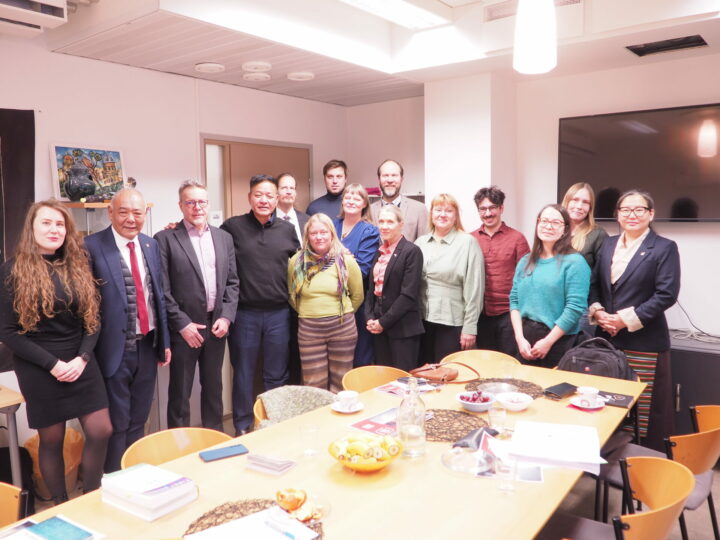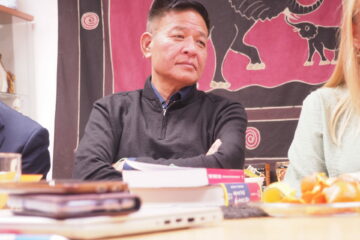The Ongoing Struggle of Tibet: Insights from Political Leader Penpa Tsering on the Human Rights Situation and the Exile Population of Tibet

Civil society actors and friends of Tibet gathered for a discussion during the visit of Tibet’s President Sikyong Penpa Tsering in Finland. KIOS was involved in organizing the discussion event, where President Penpa Tsering, the political leader of the Tibetan exile community, shared valuable insights into the complex geopolitical situation surrounding Tibet. He touched upon the historical context, human rights issues, environmental concerns, and China’s global influence.

In the picture, Sikyong Penpa Tsering, the second president of the Tibetan government-in-exile.
During the discussion, the democratically elected leader of the government-in-exile, Sikyong Penpa Tsering, provided a historical perspective on Tibet’s political journey, emphasizing the challenges faced in the early stages of democracy. He discussed significant reforms and milestones, including the retirement of the Dalai Lama in 2011 and the subsequent election of the first Sikyong. The long-standing human rights situation in Tibet was a central point, and President Tsering highlighted the intense surveillance, describing it as almost surreal and reminiscent of Orwell’s famous novel, 1984. In recent years, China has tightened its control over Tibet, further restricting the realization of basic human rights in the region. Restrictions on freedom of speech and religion, as well as forced relocations of nomads, pose serious challenges to human rights. Tsering also noted a deterioration in the human rights situation affecting other marginalized minorities in China, such as Uighurs, Mongols, and Hong Kong residents. According to Tsering, it is a shared experience of discrimination, as regardless of the target, the same China is responsible for human rights violations. Monasteries, significant institutions for Tibetan culture, have been targets since the beginning of Chinese rule. Tsering explained how the number of monks is decreasing, monasteries are under strict control, and rigorous permits are required for movement.
Nevertheless, Tsering’s speech highlighted the optimism of the Tibetan people. The Tibetan government-in-exile is quite exceptional, and despite being refugees, Tibetans are a resilient community. What they need in this situation is international attention and support to ensure the preservation of their culture and community. The worst outcome would be the international community forgetting the situation of Tibet.
China’s actions also impact the biodiversity of the region.
China’s influence on Tibet and neighboring areas is part of a broader complex scenario, encompassing China’s impact on the environment, economy, and geopolitics. Tsering pointed out environmental issues, as China exploits Tibet’s natural resources and builds dams that adversely affect the region’s biodiversity and water supply on a larger scale. Tsering suggested discussing China’s impacts not only from a political but also from an ecological perspective. Tibet, contrary to common preconceptions, has significant and unique biodiversity. China’s activities in the region negatively affect its preservation. Particularly, the rivers originating from the Tibetan mountains are crucial to China’s influence in the area, as the country seeks to control vital waterways, impacting the entire region and causing severe consequences such as droughts and floods. All of this depends on how China chooses to utilize the region’s water resources depending on the situation.
Tsering actively expressed his concerns and provided examples of how China’s global influence extends across Asia and the Pacific. China actively utilizes various friendship and study groups in Western countries to promote its agenda.
At the same time, China is grappling with serious economic challenges, such as youth unemployment, homelessness, and inflation, leading to local government bankruptcies. According to Tsering, China’s uncertainty is also evident in stringent internal measures restricting leaders’ meetings and internal freedom. The fear of internal coups has led to the isolation of military leaders, affecting China’s military readiness. In the midst of these challenges, the Tibetan government-in-exile seeks to navigate a complex situation and emphasizes the importance of unity and understanding China’s actions.
Defend your values
President Tsering’s message to Finland was clear: defend your values, as they are under threat. Tsering believes that the war in Ukraine has awakened Europe at least partially. However, efforts to undermine democracy and human rights are not ending. Therefore, according to Tsering, it is crucial to understand China’s methods and intentions. Above all, European states should consider common practices and policies in relation to China, especially at the trade and foreign policy levels. Tsering also emphasizes non-violence, stating that violence only begets more violence and is never a solution. For this reason, Tibet is not seeking independence from China but autonomy. Tsering also highlighted how Tibetans have sought to learn from Finland, particularly from the situations of the Sámi and Åland Islanders.
Throughout the discussion, a common message resonated: the world must pay attention to the situation in Tibet, understand China’s true intentions, and take a stand against authoritarianism. By increasing awareness and reducing economic dependence on China, democratic societies can contribute to global efforts to uphold justice, human rights, and environmental preservation.
